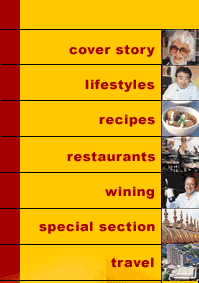


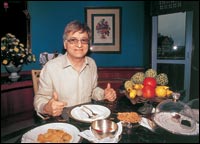 Hi Noon The Indian Curry King
Hi Noon The Indian Curry King
G. K. NOON, the Bombay Halwa man, is now the brains and genius behind Noon Products Plc of Middlesex, and one of the reasons why Indian food is so popular in UK. He assures the authentic taste of India through his chilled and frozen foods sold in leading food stores and supermarkets like Sainsbury and Waitrose. He tells MARK MANUEL the story of his life. |
|
NEXT time you are in London and feeling a little homesick, get yourself a couple of tins of G. K. Noon�s chilled and frozen Indian meals. They�re ready to eat and need only to be warmed up. I suggest you pick up the Chicken Tikka Masala with Rice. Yes, I know it is now Britain�s national dish. But who made it that? And, perhaps, it might not be a bad idea to also pick up a Beef Rogan Josh. Or a Chicken Korma with Rice. They�re all in the same league, these tinned foods. The rice is Basmati. And the chicken and meat is of the finest quality that the UK can produce. That is not my guarantee. Nor Noon�s. That is the guarantee of Her Majesty the Queen of England, who made the Indian entrepreneur an OBE sometime ago for his invaluable contribution to the food industry of Britain. And it is also the assurance of such established consumer stores in UK as Sainsbury, Waitrose, Birds Eye Walls and Forte�s Welcome Break, which stock Noon�s frozen foods. I met him not so long ago at the Taj Mahal Hotel in Bombay. I don�t know if you are aware, but Noon (�everybody calls me �Noon�,� he said) is the same businessman whose family introduced the rubbery, pulling halwa to Bombay a hundred years ago under the brand name Royal Sweets. They started with two small outlets at Crawford Market and Grand Road, and then grew and spread out as the halwa gained popularity and became known everywhere as Bombay Halwa. Noon sort of inherited the business when he was eight. He worked as an apprentice in the sweetmeats shops and factory then went onto become its managing director and finally a partner. I asked him whether he knew the recipe for the famous Bombay Halwa. �I don�t know how to make it, but I know the process,� Noon admitted. �I should know that much at least, after all, I have been in the food business for 42 years.�
Noon describes what happened. �The first week, I did business of only 62 pounds. My heart sank. To think I had left a flourishing business in Bombay to come here and do this!� Idi Amin came to his rescue. The Uganda dictator drove away hundreds of Indian families from that country and they came to settle in the UK. And Noon�s business of Indian sweets, which the English had turned their noses up at, and which was primararily meant for Asians, took off. Soon they were being sold at the local supermarkets. But the Bombay Halwa never got popular. And when Indian sweets reached a saturation point, Noon realised he would have to get into the mainstream food market if he were to survive in the UK. In 1989, the Taj Group of Hotels� Ajit Kerkar approached him and asked Noon to become a partner in their frozen foods business in New York. �Kerkar and I went to New York and set up this beautiful frozen foods company in Queens opposite La Guardia Airport. JRD Tata himself came to inspect it. The idea was the frozen food company would supply the Taj Group�s nine satellite restaurants in the US. We called the company Shamiana Foods. But we were ahead of our time, at least by 20 years, and the business flopped. I wrote off my losses in 1983, the Taj struggled for a couple of years more, then sold out. And I came back to UK and began looking for an opportunity in the food business.�
When his products came on the shelves in Sainsbury, they started selling so fast that Noon could not keep up with the production. They were working day and night for six days a week, but yet couldn�t meet the demand. Birds Eye Walls advertised Noon�s Indian foods and the sales went vertical. �We had to start working on Sundays too,� Noon exclaimed. But Birds Eye Walls had no shop of their own. So when Sainsbury called and asked him bluntly what was wrong with their own frozen and chilled Indian foods, Noon told them, �They�re rubbish! You can�t sell them in such a prestigious market.� Then Noon produced all the food packets he had, they warmed these up, and everybody sat down and had lunch. �They enjoyed what they had eaten. Then Sainsbury asked me to develop some products for them,� Noon said. He started with eight, and is now giving them 35. In 1991, he started his own brand, Noon Products, and began exporting to Europe, Hong Kong, the Middle East. What he is providing is authentic Indian meals made with the choicest ingredients in the traditional manner of the Indian housewife. These are not tastless tinned curries stuffed with sultnas and apples. This is the start of the Indo-British food revolution that began on street corners with tandoors and spread to takeaways and upmarket restaurants offering haute cuisine. The revolution was complete when supermarkets there gave precious shelf space to Noon Products and his tikkas and kormas became as much a part of the housewife�s weekly family shopping as cornflakes and cheddar cheese. Noon Products makes 150,000 to 170,000 meals a day. And he is confident of doubling the capacity by 2003. By 2004, when his new plant is ready, he will be making quarter of a million meals a day. �Come see my plant,� he invited me, �It is a benchmark... people die to see it.�
|

Home Page
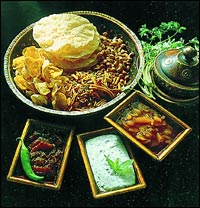 Indeed he has. Though to look at him today at 65, you would not say that Noon has come up the hard way, that he has taken chances and been through the fires. He is quite a suave man, like a young Robert Redford, and I admired the frank and easy manner in which he told me his story... warts and all. When he was still with Royal Sweets, he had made up his mind that he wanted to establish himself in the food business in England. So he started going to London as a tourist from 1969. Then, when he found he was spending more time there than here, Noon decided to set his sweetmeats business there and started manufacturing Bombay Halwa under the brand name Royal Sweets in 1971.
Indeed he has. Though to look at him today at 65, you would not say that Noon has come up the hard way, that he has taken chances and been through the fires. He is quite a suave man, like a young Robert Redford, and I admired the frank and easy manner in which he told me his story... warts and all. When he was still with Royal Sweets, he had made up his mind that he wanted to establish himself in the food business in England. So he started going to London as a tourist from 1969. Then, when he found he was spending more time there than here, Noon decided to set his sweetmeats business there and started manufacturing Bombay Halwa under the brand name Royal Sweets in 1971.
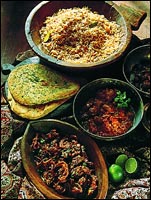 That�s when Noon discovered Indian frozen foods being sold by Sainsbury, Britain�s leading food retailer with 328 outlets, and Waitrose, which has a chain of over 100 supermarkets. �I tried them out,� he said. �They were insipid, unappealing, and badly packaged. �Would I eat this,� I asked myself. Absolutely not. That�s when I decided to do something about chilled and frozen Indian foods.� He hired Chef Ashok Kaul of Air-India, worked out the preparations of his future company Noon Products from home, then bought a small place in Southall, set up a food plant, installed machinery, experimented and brought out some products of foods. �I got advisers, bought vans, hired half-a-dozen salesmen, and started supplying the corner shops with my products. But after some time I realised this is not what I wanted to do. Who was the largest manufacturer and distributor of frozen foods? Birds Eye Walls, which was owned by Unilever. I approached them with three products: Chicken Tikka Masala and Rice, Beef Rogan Josh and Chicken Korma with Rice. All ready to eat. Convincing them was difficult. But quality and consistency is always taken seriously. Birds Eye Walls gave me the opportunity to do these three products under their brand name. It was like a turnkey job.�
That�s when Noon discovered Indian frozen foods being sold by Sainsbury, Britain�s leading food retailer with 328 outlets, and Waitrose, which has a chain of over 100 supermarkets. �I tried them out,� he said. �They were insipid, unappealing, and badly packaged. �Would I eat this,� I asked myself. Absolutely not. That�s when I decided to do something about chilled and frozen Indian foods.� He hired Chef Ashok Kaul of Air-India, worked out the preparations of his future company Noon Products from home, then bought a small place in Southall, set up a food plant, installed machinery, experimented and brought out some products of foods. �I got advisers, bought vans, hired half-a-dozen salesmen, and started supplying the corner shops with my products. But after some time I realised this is not what I wanted to do. Who was the largest manufacturer and distributor of frozen foods? Birds Eye Walls, which was owned by Unilever. I approached them with three products: Chicken Tikka Masala and Rice, Beef Rogan Josh and Chicken Korma with Rice. All ready to eat. Convincing them was difficult. But quality and consistency is always taken seriously. Birds Eye Walls gave me the opportunity to do these three products under their brand name. It was like a turnkey job.�
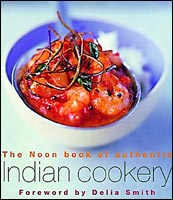 He is passionate about food and enjoys cooking. He had just come out with a book on Indian cookery that has a foreword by the legendary food writer Delia Smith. He presented me with it. Delia had written about the only time she had cheated on dinner guests. �Hidden in my kitchen were a variety of packs of Noon�s wonderful factory-made curries. I didn�t actually claim dinner was homemade, but my guests assumed it was, and at the end I got embarrassing and very genuine compliments on the flavour and authenticity of the meal. When you see the quality, care and inventiveness that go into Noon�s production process, you
can understand why such praise is
entirely deserved.�
He is passionate about food and enjoys cooking. He had just come out with a book on Indian cookery that has a foreword by the legendary food writer Delia Smith. He presented me with it. Delia had written about the only time she had cheated on dinner guests. �Hidden in my kitchen were a variety of packs of Noon�s wonderful factory-made curries. I didn�t actually claim dinner was homemade, but my guests assumed it was, and at the end I got embarrassing and very genuine compliments on the flavour and authenticity of the meal. When you see the quality, care and inventiveness that go into Noon�s production process, you
can understand why such praise is
entirely deserved.�